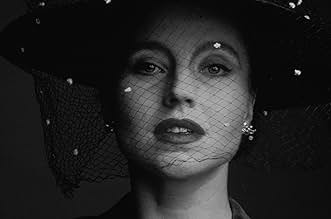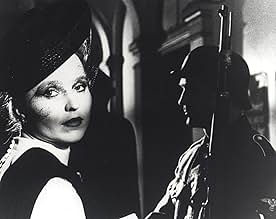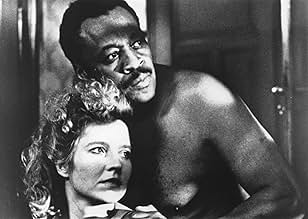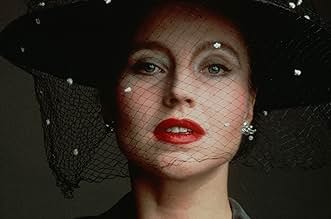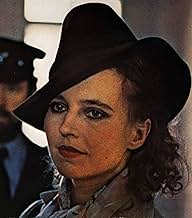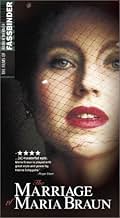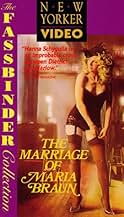NOTE IMDb
7,7/10
16 k
MA NOTE
Une veuve de la Seconde Guerre mondiale tente de s'adapter à la vie dans l'Allemagne d'après-guerre.Une veuve de la Seconde Guerre mondiale tente de s'adapter à la vie dans l'Allemagne d'après-guerre.Une veuve de la Seconde Guerre mondiale tente de s'adapter à la vie dans l'Allemagne d'après-guerre.
- Réalisation
- Scénario
- Casting principal
- Récompenses
- 13 victoires et 7 nominations au total
George Eagles
- Bill
- (as George Byrd)
Günter Lamprecht
- Hans Wetzel
- (as Günther Lamprecht)
Avis à la une
First and best of Fassbinder's Post-WWII "Wirtschaftswunder" films. His lead character, a young woman, determined to emerge out of Germany's WWII ruins as a success, literally "walks over corpses" to get what she wants. Marrying a man doomed to be among the last to "fall" for the Fuehrer and the German Reich, Maria is now "Frau" instead of "Fraulein". Initially searching for her MIA husband, she eventually gives it up and moves on. Climbing the ladder, Maria Braun has her share of good times. Showering her impoverished family with lavish presents and lifting everyone's life-style up by a notch, Maria becomes the celebrated "Wunderkind" who gets whatever she wants. Although her uppity attitude isn't always popular, and there is plenty of talk about Maria (and her "ways"), Maria Braun laughs it all away. The Marlene Dietrich-like heroine always has the last laugh, as the shocking ending proves.
This is a Modern Classic, one of the very best films to come out of the 1970s/80s German Cinema. Much stronger than "Veronica Foss" and in the league of "Das Boot", "The Marriage of Maria Braun" is a product of Modern German Dramatic Cinema's golden age. No sugar coating, just pure, unadulterated truth as seen through the rear-view mirror of people who have lived the horrors and survived into new tomorrows. A true gem of a film!
This is a Modern Classic, one of the very best films to come out of the 1970s/80s German Cinema. Much stronger than "Veronica Foss" and in the league of "Das Boot", "The Marriage of Maria Braun" is a product of Modern German Dramatic Cinema's golden age. No sugar coating, just pure, unadulterated truth as seen through the rear-view mirror of people who have lived the horrors and survived into new tomorrows. A true gem of a film!
A complex, pessimistic tale of post WWII Germany, this is one of Fassbinder's masterpieces that brings a step beyond the classic melodrama form articulated by Douglas Sirk. When Hanna Schygulla says to her husband in prison `this are bad times for feelings' it is Fassbinder saying that in the seventies cinema there's no place for the classic melodrama of the 40s and 50s, unless all the craze that then was suggested now turns somehow more explicit. Fassbinder has a quality of elevating low elements into the realms of High Art, not only through the services of his personal use of the camera, but also through an admirable compassion towards his material.
There is a strong resemblance of 'Maria Braun' to Curtiz' noirish 'Mildred Pierce'. While Mildred rebuilds her life after a personal tragedy, so does Maria, albeit in the backdrop of the post-war German economic disaster. Just as Mildred's loyalty was to her daughter, for Maria it was her husband Hermann (her man?). The two make sacrifices for each other hoping to build a better life for themselves. The major difference is that Maria's husband is a much more sympathetic character than Mildred's daughter, which robs the movie of some tension. Of course since Maria herself is not a very likeable person, one doesn't feel too much for her.
The story in a nutshell is of almost war widow Maria Braun rebuilding her life in post war Germany & rising high on the corporate ladder till she realises that she has given too much of herself for the climb to enjoy the cause she was climbing for.
Standing by itself, I still think this movie will appeal either to European baby boomers or serious students of Fasbinder. The narrative is straight forward & the final TV audio track is a brilliant touch. Hanna Schygulla as Maria gives yet another great performance for Fasbinder.
The story in a nutshell is of almost war widow Maria Braun rebuilding her life in post war Germany & rising high on the corporate ladder till she realises that she has given too much of herself for the climb to enjoy the cause she was climbing for.
Standing by itself, I still think this movie will appeal either to European baby boomers or serious students of Fasbinder. The narrative is straight forward & the final TV audio track is a brilliant touch. Hanna Schygulla as Maria gives yet another great performance for Fasbinder.
Alright already, get over it, was Handke's comment to the 1968 meeting of the Gruppe 48 -- those writers who wanted to "heal" from the war. Well Fassbinder doesn't want to heal, he wants to indict. And this movie, probably his most accessible, takes a woman as the symbol for the nation-- a theme common to prehistoric oral literature, particularly among the Irish, made famous by Grimmelshausen's Mother Courage and updated by Brecht's play. But in this version, instead of the tragic Mother trying to save her children and mourning them, Maria Braun sells out for comfort from collaboration with the Nazi's through the economic wonder "Wirtschaftswunder" of the cold war. This was Fassbinder's big hit, because he toned down his politics both sexual and marxist, to focus on the loss of soul that Germany experienced. It was also Hanna Schygulla's Oscar worthy performance, probably one of her best of many great ones. Like little Oskar from the Tin Drum, Maria Braun was stunted by the experience, only on the inside.
Maria Braun's marriage is a very successful metaphor for post-war Germany, for the economic miracle played by Adenauer, himself heard several times in the film, in his speeches appealing to pride in German economic reconstruction.
In the rubble of the Second World War, Maria/Germany survives, between a tenuous hope of returning to the lost past and the agony of a miserable and dishonorable present.
But the defeated have no right to shame. It is up to them to rebuild the future in the bed of the victors, until they learn to live without them, more than autonomously, as new victorious powers, taking the place of those who humiliated them. In life, in the economy or even in football (Fassbinder coincides the narrative climax with the 1952 World Cup final, in which Germany became champion, for the first time in the history of the competition, thus using yet another metaphor for German reconstruction).
After the victory is complete, the honor is washed away, life ends and it is time to give way to others, to the future, which must not repeat the mistakes of the past.
A bold message and a powerful performance by Hanna Schygullla.
Fassbinder at his best.
In the rubble of the Second World War, Maria/Germany survives, between a tenuous hope of returning to the lost past and the agony of a miserable and dishonorable present.
But the defeated have no right to shame. It is up to them to rebuild the future in the bed of the victors, until they learn to live without them, more than autonomously, as new victorious powers, taking the place of those who humiliated them. In life, in the economy or even in football (Fassbinder coincides the narrative climax with the 1952 World Cup final, in which Germany became champion, for the first time in the history of the competition, thus using yet another metaphor for German reconstruction).
After the victory is complete, the honor is washed away, life ends and it is time to give way to others, to the future, which must not repeat the mistakes of the past.
A bold message and a powerful performance by Hanna Schygullla.
Fassbinder at his best.
Le saviez-vous
- AnecdotesInspired by "Mutter Courage und ihre Kinder" (1938/39), a play by Bertolt Brecht, and Liliane (1933).
- GaffesAt the end of the cut of the two kids blowing up the firecrackers, they start laughing but no sound is heard. The sound of laughter is heard on the next cut after they get yelled at by the man scavenging for wood.
- Citations
Maria Braun: I'm a master of deceit: a capitalist tool by day, and by night an agent of the proletarian masses - the Mata Hari of the Economic Miracle.
- Crédits fousAt the very end of the credits the following persons are 'credited' by their picture: Konrad Adenauer, Ludwig Erhard, Kurt Georg Kiesinger and Helmut Schmidt and a disconnected phone line can be heard.
- Bandes originalesIn The Mood
Written by Wingy Manone, Andy Razaf and Joe Garland
Meilleurs choix
Connectez-vous pour évaluer et suivre la liste de favoris afin de recevoir des recommandations personnalisées
- How long is The Marriage of Maria Braun?Alimenté par Alexa
Détails
- Date de sortie
- Pays d’origine
- Sites officiels
- Langues
- Aussi connu sous le nom de
- The Marriage of Maria Braun
- Lieux de tournage
- Sociétés de production
- Voir plus de crédits d'entreprise sur IMDbPro
Box-office
- Budget
- 1 975 000 DEM (estimé)
- Montant brut aux États-Unis et au Canada
- 8 144 $US
- Week-end de sortie aux États-Unis et au Canada
- 11 623 $US
- 16 févr. 2003
- Montant brut mondial
- 11 869 $US
Contribuer à cette page
Suggérer une modification ou ajouter du contenu manquant


